Dagstuhl Seminar 22222
Radical Innovation and Design for Connected and Automated Vehicles
( May 29 – Jun 03, 2022 )
Permalink
Organizers
- Wendy Ju (Cornell Tech - New York, US)
- Bastian Pfleging (TU Bergakademie Freiberg, DE)
- Andreas Riener (TH Ingolstadt, DE)
Contact
- Andreas Dolzmann (for scientific matters)
- Susanne Bach-Bernhard (for administrative matters)
Schedule
Automated driving will most likely be the next big change in individual mobility. Currently, research is still primarily concerned with technical challenges of Automated Driving Systems (ADS), such as sensing, data processing, communication, or steering. HCI researchers have already started to develop concepts for working, relaxing, or recreational activities (in privately owned) ADS as rather incremental innovations. There is, however, room to think about creative ways to use automated vehicles (AV) and connected technology towards the public interest beyond incremental changes. Current open questions are, amongst others:
- What are possible innovative and groundbreaking visions for future human transport concepts?
- How can we apply radical innovation and design and leverage AV technology to other applications and use cases?
- What types of research and design methods are able to contribute to radical designs, instead of incremental?
This Dagstuhl Seminar aimed to contribute to continued research that is able to challenge the current generative/evaluative research approach for automated driving systems against a radical innovations attempt. Similar to the invention of the car, which was not just an incremental improvement of a horse carriage, we want to question whether the current incremental research approach is appropriate and want to provoke novel opportunities. We further wanted to challenge whether a human-centered design approach is appropriate in the domain of connected, automated vehicles or if related innovation-centered approaches like design thinking are more constructive.
An integral part of the seminar was to reach the next level of product quality, to learn from each other, and to disseminate individual's experience for boosting subsequent research. In order to give the seminar participants something they can use directly from the seminar, we dedicated two blocks of time for teaching methodological knowledge in addition to the creative sessions, interactive panels and practical work. The goal was to give the participants the opportunity to try out new methods, such as brainwriting, bodystorming, focus groups, user enactment, WorldCafe, amongst others, that they would like to use in their own research in the future - thus a directly applicable result of the seminar. Details on the schedule of the seminar are shown below.
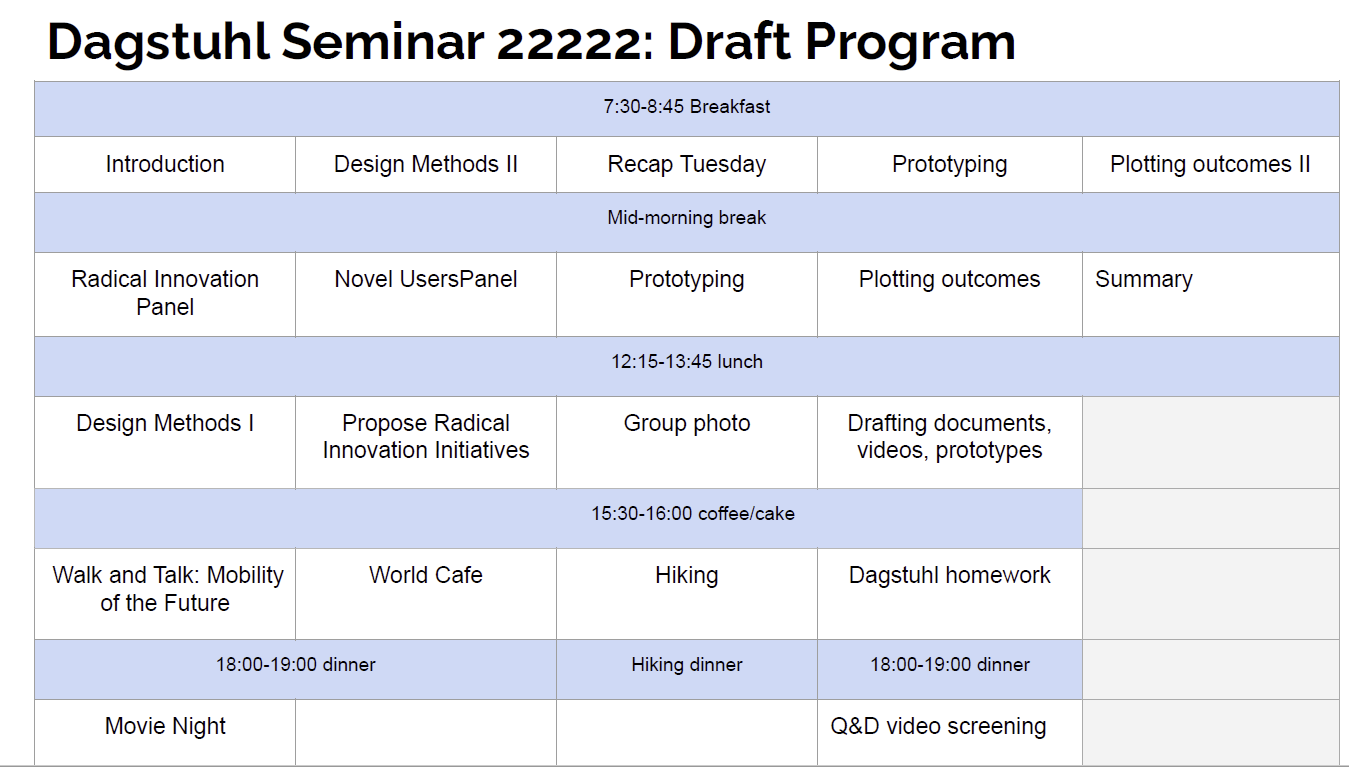
To promote trans- and interdisciplinarity, we invited computer scientists/engineers, interaction designers, UI/UX designers, market and consumer psychologists as well as urban planners from industry and academia to discuss and design future mobility and vehicle concepts. We expected three types of results from this seminar - and will discuss at the end of this report which contributions were created in the seminar and to which degree these results were achieved by the end of the seminar.
- New visions for transportation and interaction. The seminar will focus on radical and innovative visions for the future of human transport and will employ innovation-centered approaches to foster out-of-the-box thinking.
- Novel applications for AV technology. Perhaps the most significant contribution of the seminar should be novel applications for automated vehicle technology that will stretch the research and science community into new directions. We expect that in the coming 3 to 10 years, these new ideas should serve as inspiration for the research of the seminar attendees and, more broadly, the communities involved in designing automotive and mobility user interfaces.
- Roadmap(s) for research. Another goal is the elaboration of a roadmap to outline proposed research collaborations and recommend new funding mechanisms. Furthermore, the roadmap should lay out plans for disseminating results such that members of our community are well informed, and such that they can effectively interact with researchers and practitioners in related communities, such as human-computer interaction, human-factors, user experience, automotive engineering, psychology, and urban/traffic planning.
Perhaps the most tangible and easy-to-communicate outcome of the seminar for other interested parties are short videos/video prototypes of ideas created over the week in group work. All of the videos were professionalized in the aftermath of the seminar and submitted, along with one short paper each, to the ACM AutomotiveUI conference, where three of the videos were accepted in the video track and shown to the audience at the conference in Seoul (videos are available as supplementary material in the ACM DL).
References
- Nikolas Martelaro, Debargha Dey, Gary Burnett, Helena K. Strömberg, Jonas Andersson, and Andreas Löcken. 2022. How to Manage Social Order in Shared Automated Vehicles. In Adjunct Proceedings of the 14th International Conference on Automotive User Interfaces and Interactive Vehicular Applications (AutomotiveUI ’22). Association for Computing Machinery, New York, NY, USA, 201 – 203. https://doi.org/10.1145/3544999.3550154
- Kai Holländer, Lutz Morich, Natasha Merat, Gary Burnett, Virpi Roto, Wendy Ju, and David Sirkin. 2022. Radical Innovations in Future Mobility and Virtual Assistants. In Adjunct Proceedings of the 14th International Conference on Automotive User Interfaces and Interactive Vehicular Applications (AutomotiveUI ’22). Association for Computing Machinery, New York, NY, USA, 209 – 211. https://doi.org/10.1145/3544999.3551501
- Regina Bernhaupt, Mark Colley, David Goedicke, Alexander Meschtscherjakov, Bastian Pfleging, Andreas Riener, and Shadan Sadeghian. 2022. A Critical Perspective on Radically Innovating Personal Mobility. In Adjunct Proceedings of the 14th International Conference on Automotive User Interfaces and Interactive Vehicular Applications (AutomotiveUI ’22). Association for Computing Machinery, New York, NY, USA, 215 – 218. https: //doi.org/10.1145/3544999.3551689
 Wendy Ju, Bastian Pfleging, and Andreas Riener
Wendy Ju, Bastian Pfleging, and Andreas Riener
Automated driving will most likely be the next big change in individual mobility. Currently, research is still primarily concerned with technical challenges of Automated Driving Systems (ADS), such as sensing, data processing, communication, or steering. HCI researchers have already started to develop concepts for working, relaxing, or recreational activities (in privately owned) ADS as rather incremental innovations. There is, however, room to think about creative ways to use automated vehicles (AV) and connected technology towards the public interest beyond incremental changes. Current open questions are, amongst others:
- What are possible innovative and groundbreaking visions for future human transport concepts?
- How can we apply radical innovation and design and leverage AV technology to other applications and use cases?
- What types of research and design methods are able to contribute to radical designs, instead of incremental?
This Dagstuhl Seminar aims to contribute to continued research that is able to challenge the current generative/evaluative research approach for automated driving systems against a radical innovations attempt. Similar to the invention of the car, which was not just an incremental improvement of a horse carriage, we want to question whether the current incremental research approach is appropriate and want to provoke novel opportunities.
In this seminar, we would like to challenge whether a human-centered design approach is appropriate in the domain of connected, automated vehicles or if related innovation-centered approaches like design thinking are more constructive. An integral part of the seminar to reach the next level of product quality, to learn from each other, and to disseminate individual’s experience for boosting subsequent research is to try-out different methods that support the “out of the box” thinking (e.g., brainwriting, bodystorming, focus groups, WorldCafé, amongst others).
To promote trans- and interdisciplinarity, we invite computer scientists/engineers, interaction designers, UI/UX designers, market and consumer psychologists as well as urban planners from industry and academia to discuss and design future mobility and vehicle concepts.
We expect three types of results from this Dagstuhl Seminar:
- New visions for transportation and interaction. The seminar will focus on radical and innovative visions for the future of human transport and will employ innovation-centered approaches to foster out-of-the-box thinking.
- Novel applications for AV technology. Perhaps the most significant contribution of the seminar should be novel applications for automated vehicle technology that will stretch the research and science community into new directions. We expect that in the coming 3 to 10 years, these new ideas should serve as inspiration for the research of the seminar attendees and, more broadly, the communities involved in designing automotive and mobility user interfaces.
- Roadmap(s) for research. Another goal is the elaboration of a roadmap to outline proposed research collaborations and recommend new funding mechanisms. Furthermore, the roadmap should lay out plans for disseminating results such that members of our community are well informed, and such that they can effectively interact with researchers and practitioners in related communities, such as human-computer interaction, human-factors, user experience, automotive engineering, psychology, and urban/traffic planning.
 Wendy Ju, Bastian Pfleging, and Andreas Riener
Wendy Ju, Bastian Pfleging, and Andreas Riener
- Jonas Andersson (RISE Research Institutes of Sweden - Göteborg, SE) [dblp]
- Regina Bernhaupt (TU Eindhoven, NL) [dblp]
- Gary Burnett (University of Nottingham, GB) [dblp]
- Mark Colley (Universität Ulm, DE)
- Debargha Dey (TU Eindhoven, NL) [dblp]
- David Goedicke (Cornell Tech - New York, US)
- Kai Holländer (LMU München, DE)
- Wendy Ju (Cornell Tech - New York, US) [dblp]
- Andreas Löcken (TH Ingolstadt, DE) [dblp]
- Nikolas Martelaro (Carnegie Mellon University - Pittsburgh, US)
- Nathasha Merat (University of Leeds, GB) [dblp]
- Alexander Meschtscherjakov (Universität Salzburg, AT) [dblp]
- Lutz Morich (frE3-innovations, DE)
- Bastian Pfleging (TU Bergakademie Freiberg, DE) [dblp]
- Andreas Riener (TH Ingolstadt, DE) [dblp]
- Virpi Hannele Roto (Aalto University, FI) [dblp]
- Shadan Sadeghian (Universität Siegen, DE) [dblp]
- Ronald Schroeter (Queensland University of Technology - Brisbane, AU) [dblp]
- David Sirkin (Stanford University, US) [dblp]
- Helena K. Strömberg (Chalmers University of Technology - Göteborg, SE) [dblp]
Related Seminars
- Dagstuhl Seminar 16262: Automotive User Interfaces in the Age of Automation (2016-06-26 - 2016-07-01) (Details)
- Dagstuhl Seminar 19132: Users and Automated Driving Systems: How Will We Interact with Tomorrow's Vehicles? (2019-03-24 - 2019-03-29) (Details)
- Dagstuhl Seminar 21232: Human-Computer Interaction to Support Work and Wellbeing in Mobile Environments (2021-06-06 - 2021-06-11) (Details)
Classification
- Mobile Computing
- Multimedia
- Society / Human-computer Interaction
Keywords
- Automated Vehicle Technology
- Automotive User Interfaces
- Radical Innovation
- Co-creation
- Participatory Design
- UX Design

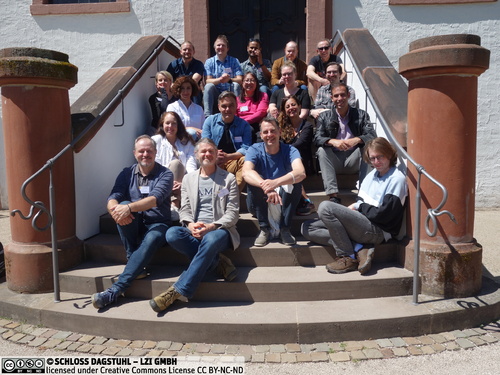
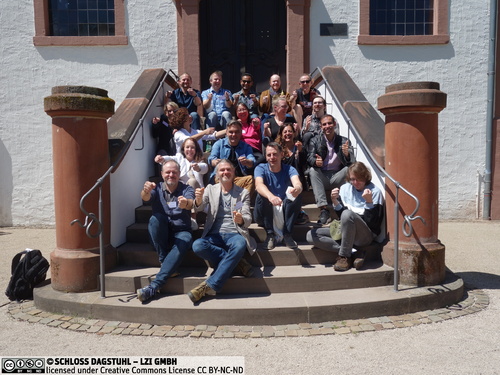
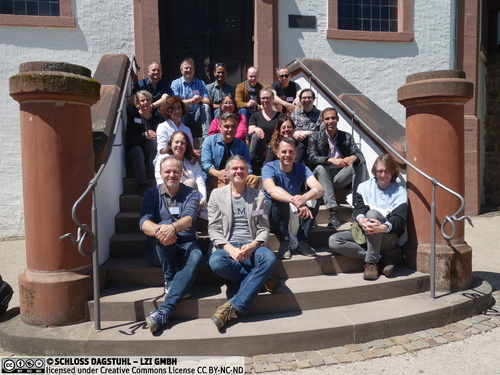
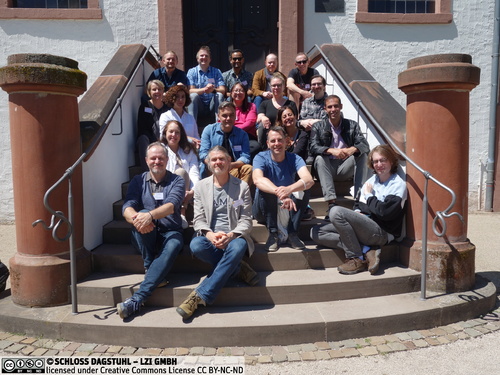
 Creative Commons BY 4.0
Creative Commons BY 4.0
